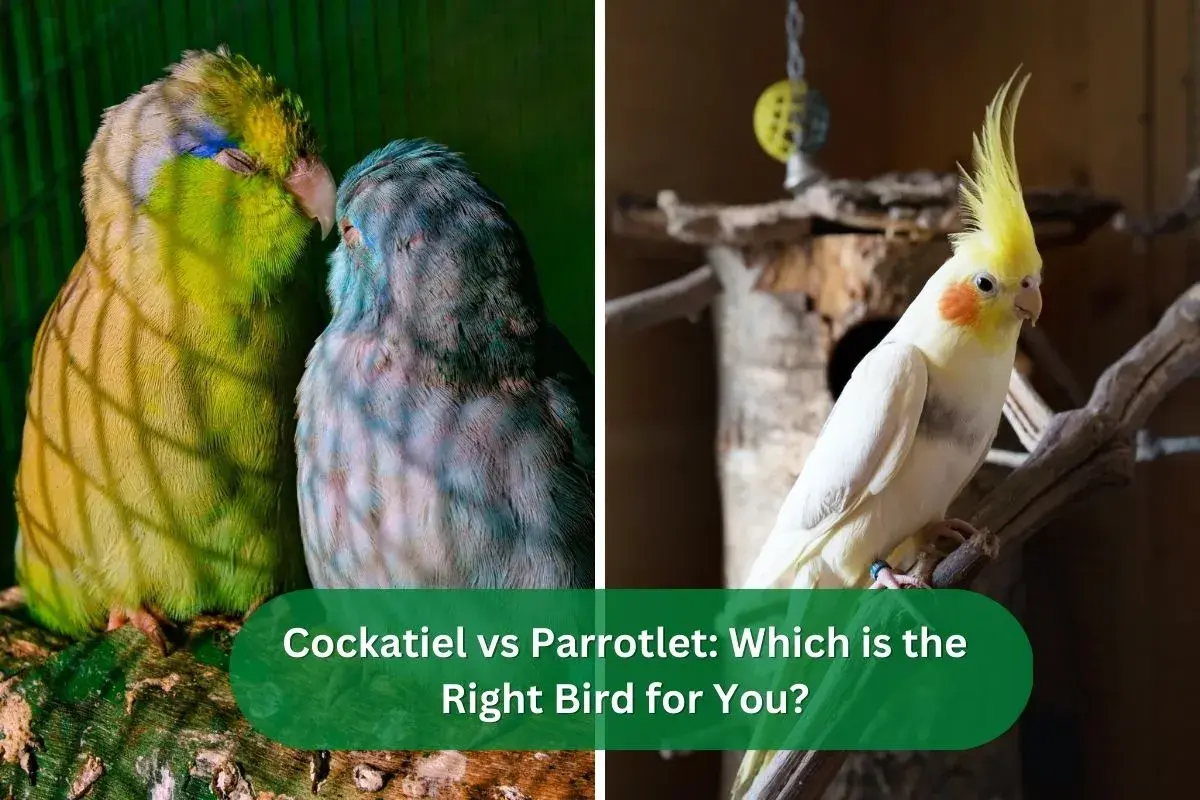If you’re considering adding a cockatiel or parrotlet to your family, you may be wondering which bird is the right one for you. Cockatiels and parrotlets are great pets but have different personalities and needs.
In this discussion, we will explore the various characteristics of cockatiels and parrotlets, including their size, personality, and care requirements, to help you make an informed decision.
Whether you are a seasoned bird owner or a first-time pet parent, there is something for everyone to learn about these fascinating creatures.
Size Comparison: Cockatiel Vs. Parrotlet
One of the main differences between cockatiels and parrotlets is their size.
Cockatiels are larger birds, typically weighing between 80 and 120 grams and reaching lengths of around 12 inches. In contrast, parrotlets are much smaller birds, typically weighing between 20 and 40 grams and reaching lengths of about 5 inches.
This size difference can be an important consideration for those looking to adopt a pet bird, as larger birds may require more space, attention, and care.
Talking Ability: Cockatiel vs. Parrotlet
Cockatiels and parrotlets can mimic human speech and sounds, but their talking abilities can vary. Cockatiels are known for being good talkers and can learn various words and phrases with consistent training and practice.
They may not be as skilled at mimicking human speech as some larger parrot species, but they can still become quite proficient at it with time and effort.
On the other hand, parrotlets are not as well known for their talking ability as some other parrot species. While they may learn a few words or phrases with consistent training, they are generally less skilled at talking than cockatiels.
Personality Differences Between Cockatiels and Parrotlets:
| Personality Trait | Cockatiel | Parrotlet |
| Affectionate | Cockatiels are generally quite affectionate and enjoy cuddling and being held. | Parrotlets are generally less affectionate than cockatiels and may be more hesitant to be handled. |
| Playfulness | Cockatiels can be playful and enjoy interacting with toys and other objects. | Parrotlets are known for being energetic and playful, and often enjoy interacting with toys and objects. |
| Noise Level | Cockatiels can be vocal, but are generally not as loud as some other parrot species. | Parrotlets are known for being relatively quiet birds and may not be as loud as cockatiels. |
| Temperament | Cockatiels can be gentle and friendly, but may also be prone to mood swings. | Parrotlets are generally known for being feisty and energetic, but can also be prone to mood swings. |
Lifespan Comparison: Cockatiel VS Parrotlet
Cockatiels and parrotlets have different lifespans, with cockatiels generally living longer than parrotlets. The average lifespan of a cockatiel is around 15 to 20 years, although they are known to live even longer with proper care.
In contrast, the average lifespan of parrotlet is around 10 to 15 years, although some individuals may live longer with good care. It’s important to consider the lifespan of a pet bird when deciding which species to adopt, as a longer-lived species may require a longer commitment in terms of care and attention.
Maintenance Requirements For Cockatiels And Parrotlets
The following table compares the care and maintenance requirements for cockatiels and parrotlets:
| Care and Maintenance Factor | Cockatiel | Parrotlet |
| Housing | Cockatiels need a spacious cage with plenty of room to move around and stretch their wings. They should also have access to a perch and toys to keep them entertained. | Parrotlets also need a spacious cage with plenty of room to move around and stretch their wings, as well as access to a perch and toys. |
| Diet | Cockatiels require a varied diet that includes a high-quality pellet or seed mix, as well as fresh fruits and vegetables. They should also have access to a source of clean, fresh water at all times. | Parrotlets also require a varied diet that includes a high-quality pellet or seed mix, as well as fresh fruits and vegetables. They should also have access to a source of clean, fresh water at all times. |
| Exercise | Cockatiels need daily opportunities for exercise, such as time out of their cage to fly and play. | Parrotlets also need daily opportunities for exercise and play, and may benefit from time out of their cage to fly and explore their surroundings. |
| Grooming | Cockatiels need regular grooming to keep their feathers in good condition, including regular baths and wing trimmings as needed. | Parrotlets also need regular grooming, including regular baths and wing trimmings as needed. |
| Training and socialization | Cockatiels can be trained and socialized with consistent training and positive reinforcement. | Parrotlets can also be trained and socialized with consistent training and positive reinforcement. |
Price Comparison: Cockatiel vs Parrotlet
The price of a cockatiel or parrotlet can vary depending on various factors, such as the age of the bird, its colour and markings, and where it is being purchased from. In general, however, cockatiels tend to be less expensive than parrotlets.
A cockatiel may cost anywhere from $50 to $200, depending on the specific circumstances. In contrast, parrotlets may cost anywhere from $200 to $400 or more, depending on the circumstances.
It’s essential to carefully research the cost of owning a pet bird before deciding to adopt, as the ongoing costs of care, including food, toys, and veterinary care, can add up over time.
Parrotlet As Pets: Pros And Cons
| Pros | Cons |
| Small size: Parrotlets are small birds that are well-suited to living in a smaller living space, such as an apartment. | High maintenance: Parrotlets can be high maintenance pets, requiring daily care and attention, as well as a varied diet and regular grooming. |
| Intelligent: Parrotlets are intelligent birds that can be trained and socialized with consistent training and positive reinforcement. | Noisy: While parrotlets are generally quieter than some other parrot species, they can still be noisy and may not be suitable for those who live in close proximity to others. |
| Long lifespan: Parrotlets have a longer lifespan than some other small bird species, with an average lifespan of 10 to 15 years. | Expensive: Parrotlets can be more expensive to purchase and care for than some other small bird species. |
| Playful: Parrotlets are known for being energetic and playful, and often enjoy interacting with toys and other objects. | Needs attention: Parrotlets require daily attention and socialization, and may become bored or destructive if they do not receive enough mental and physical stimulation. |
Wrapping Up
The decision of which species is the right bird for you will depend on your personal preferences, lifestyle, and resources. It’s important to carefully research and consider all of the factors involved in owning a pet bird before making a decision, and to make sure that you are prepared to provide the necessary care and attention for whichever species you choose.

